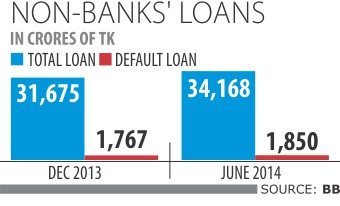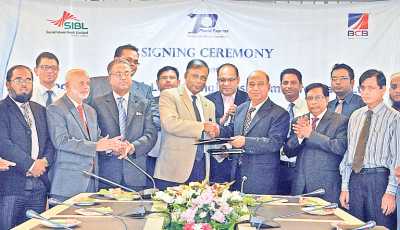BB-BKB MoU to give loan to slum-dwellers signed
Bangladesh Krishi Bank (BKB) signed an agreement with Bangladesh Bank to utilize Tk 2.0 crore fund for giving the capital’s slum-dwellers loan to initiate income generation venture after returning to their respective villages.
BB’s executive director M Mahfuzur Rahman and BKB’s managing director Abdus Salam signed the agreement on behalf of their respective sides. The central bank will give BKB Tk 2.0 crore for its “Ghore Fera Kormo Suchi” (go back home project), rteports BSS.
BB Governor Dr Atiur Rahman and top officials of BB and BKB were present at the loan signing function.
In his brief speech, BB Governor Dr Atiur Rahman said the central bank is giving Tk 2.0 crore to this programme. If necessary, it will increase its financing in future, he added.
BB’s executive director M Mahfuzur Rahman said BB is offering the fund to take back the urban poor to their homes under the “Ghore Fera Kormo Suchi” of the government.
He said the central bank is providing BKB the money from its housing fund at 2.0 percent rate of interest when the borrowers from BKB would pay only 6.0 percent annually.
Under the programme, the eligible borrowers can get Taka 20-40 thousand loan for income generating projects besides Tk 50,000 for housing. Introduced in 2010, the government so far allocated Tk 10 crore for the project to help slum-dwellers go back home and employ themselves.
EBL launches Hajj travel card
Eastern Bank Limited (EBL), in association with Visa, the leading global payment technology company, has launched special Visa Hajj and Umrah travel prepaid card, says a press release. The card aims to offer hassle free international travel for pilgrims, along with a secure and reliable way to pay. According to the release, the card is a smart alternative to paper-based instruments like traveller’s cheque or currency notes for the pilgrims traveling to Saudi Arabia to perform Hajj and Umrah. Pilgrims can load required foreign currency at home by paying in Bangladeshi currency.
Ali Reza Iftekhar, managing director and CEO of the bank, said, “EBL was the first bank in Bangladesh to launch Hajj prepaid cards in 2010. This year onward we will be offering card users added features and benefits.”
Jamuna Bank promotes AMD

Mosleh Uddin Ahmed has recently been promoted to the post of additional managing director of Jamuna Bank, the bank said in a statement yesterday.
Ahmed joined Jamuna Bank as deputy managing director in 2013, and worked with City Bank prior to that. He has more than two decades of banking experience, according to the statement.
He graduated in electrical and electronic engineering and later did an MBA from the Institute of Business Administration under Dhaka University.
Non-banks on a more stable financial keel than banks

Non-bank financial institutions' default loans did not increase as much as banks in the first six months due to low volumes of loan portfolio.
Between December 31 last year and June 30 this year, the NBFIs' default loans increased 4.69 percent in contrast to banks' 26 percent.
At the end of June, their default loans stood at Tk 1,850 crore, which is 5.4 percent of their total credit. On December 31 last year, defaults amounted to Tk 1,767 crore, 5.58 percent of their total credit.
Bank officials said the default loans of the NBFIs increased at a lower rate as their loan volume is smaller than banks'. On June 30, the total outstanding loans of banks stood at Tk 34,168 crore, 8.5 percent of their total advances.
Of the 30 NBFIs, 10 had default loans upwards of 10 percent.
Asad Khan, chairman of the Bangladesh Leasing and Finance Companies Association, said though bad loans of NBFIs increased slightly, it is much better than that of banks.
“We have seen nothing like the recent scams in banks in issuing loans in the NBFI sector.”
Khan, also the managing director of Prime Finance and Investment Ltd, said the NBFIs were cautious in disbursing loans, keeping their default rates low.
He, however, expressed concern about the narrowing of the playing field for the financial sector in general. At present, 56 banks and 31 NBFIs operate in the country.
While the number of institutions has increased, business has not increased proportionately, according to the Prime Finance MD.
Meanwhile, owing to their default loan portfolio, the NBFIs' capital position is improving by the day. Last year, the NBFIs' capital base increased 17.7 percent year-on-year to Tk 7,280 crore.
“The trend of increasing capital shows the moderately sound financial base of NBFIs,” said the central bank's Financial Stability Report published last week.
In 2013, the NBFIs' total operating profit increased 47 percent to Tk 1,660 crore.
The major funding sources of NBFIs are: capital, term deposits, credit facilities from banks and other NBFIs, call money, bonds and securitisation.
NBFIs are allowed to mobilise term deposits only with tenure no less than six months. Banks also invest in bonds/debentures issued by NBFIs, which is another source of funds.
The loans disbursed by the NBFIs though are concentrated in a few sectors.
Around 15 percent of the loans extended by NBFIs went to trade and commerce, 12 percent to power, gas, water and sanitary service, 12 percent to housing and 9 percent to garment and textile sector, according to the central bank report.
News:The Daily Star/7-Sep-2014
SIBL signs deal with BCBL

Social Islami Bank Limited (SIBL) and Bangladesh Commerce Bank Limited (BCBL) have recently signed an agreement to boost remittance inflow in the country.
Under the agreement, BCBL through its all branches will directly disburse remittance processed by Placid NK Corporation of USA through Social Islami Bank, said a press release.
Managing Director of SIBL Md Shafiqur Rahman and Managing Director of BCBL Abu Sadek Md Sohel signed the agreement.



